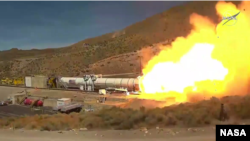The U.S. space agency, NASA and aerospace firm Northrop Grumman Wednesday conducted a full-scale test of a rocket motor, known as a "Flight Support Booster" or "FSB-1,” that will power the first Artemis mission to the moon.
During the test at Northrop Grumman's facility in Promontory, Utah, the 47-meter booster motor was anchored to the ground horizontally, and fired for just over two minutes, producing 1.6 million kilograms of thrust.
NASA and Northrop Grumman will use data from the test to evaluate the motor’s performance using potential new materials and processes that can be incorporated into future boosters. NASA has contracted Northrop Grumman to build boosters for future rocket flights.
Two similar boosters will be used on NASA's Space Launch System (SLS), the most powerful rocket the space agency has ever built. They will provide 75 percent of the power needed to send the rocket into space. NASA says the SLS is the only rocket that can send the space craft, Orion, astronauts and supplies to the Moon in a single mission.
NASA plans to send the first woman and next man to the lunar surface by 2024, with a goal of exploring Mars targeted for the mid-2030s.
The successful test sets the stage for a planned launch, without crew, from the Kennedy Space Center in Florida next year, before a crewed launch in 2023.
In Greek mythology, Artemis is both the goddess of the moon and the twin sister of Apollo.






